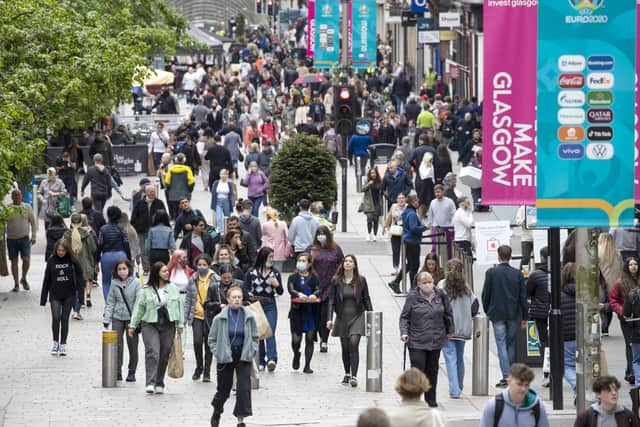UK service sector cools as inflation squeezes consumer demand: reaction
The closely-watched IHS Markit/Cips UK services PMI (purchasing managers’ index) survey scored 53.4 in May, tumbling from a 58.9 reading in April.
Any score above 50 denotes growth. However, this represented the weakest figure since February 2021, as companies highlighted “subdued business and consumer confidence” due to concerns over the economic outlook.
Advertisement
Hide AdAdvertisement
Hide AdTim Moore, economics director at S&P Global Market, said: “May data illustrate a worrying combination of slower growth and higher prices across the UK service sector.
“The latest round of input cost inflation was the steepest since this index began in July 1996, while the monthly loss of momentum for business activity expansion was a survey record outside of lockdown periods.”
Surveyed service firms witnessed “escalating energy, fuel and raw material costs”, while wages were also pushed higher. Around 70 per cent of companies reported a rise in their average costs since the previous month.
The data for May also highlighted that there was a survey-record increase in prices charged by service providers to customers, which they said affected demand.
In addition, the report signalled a slowdown in new order growth across the sector, with the rate of new business expansion dropping to its weakest since December last year.


Nevertheless, companies also reported another robust improvement in staffing numbers for the month.
Duncan Brock, group director at the Chartered Institute of Procurement & Supply, said: “One bright spot was strong employment levels.
“Job-seekers still had the pick of the bunch in terms of roles and requested salaries but, as capacity levels are reached and new order gaps appear, the window of opportunity is starting to close.
Advertisement
Hide AdAdvertisement
Hide Ad“The sudden fall in the overall index is a cause for worry and was reflected in the sector’s optimism, which was the lowest since the height of the pandemic in October 2020. Recessionary fears are growing bigger and stronger.”
Walid Koudmani, chief market analyst at financial brokerage XTB, said: “The negative economic climate has led growth projections to fall to the lowest since October 2020 while business activity expansion eased for the second consecutive month.
“While the main concerns continue to be rising costs and a decrease in buying power, potential action from the Bank of England and government may alleviate this pressure slightly but may be unable to significantly impact the situation in the long term.”
Government high streets task force expert and ShopAppy founder Jackie Mulligan noted: “Inflation is decimating consumer demand. We work with and hear from thousands of small independent retailers around the country and many are having a far tougher time of it now than during the pandemic.
“It’s devastating to see a growing number of them have to shut up shop for the last time. This isn’t a cost of living crisis, it’s a cost of living catastrophe.
“Small independent retailers, many of whom have lots of debt that they accrued during the pandemic, are being kicked while they’re down and this time no one is stepping in to help.”
Comments
Want to join the conversation? Please or to comment on this article.